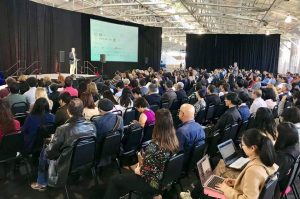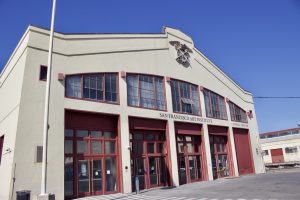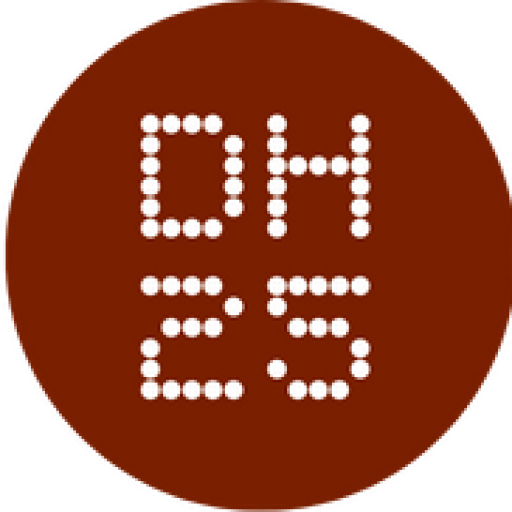📣 Call for Location – DigitalHeritage 2027/2028
🌍 Do you want to be the next host of DigitalHeritage – the world’s leading event on cultural heritage and emerging technologies?
The DigitalHeritage 2025 Committee is inviting institutions worldwide to submit proposals to host the next edition of the Congress in 2027 or, preferably, 2028.
In line with the rotation mechanism, non-European institutions will be prioritised.
digitalheritage@unisi.it.
🗓️ DEADLINE: September 11, 2025
Background
Digital Heritage is a premier international event that unites multiple heritage domains and conferences under one platform. The idea for this event dates back to 1998, when it was first discussed as “Virtual Heritage” during a meeting in Japan with UNESCO, the VSMM Society, and other key organizations. It was officially formalized in 2013 at UNESCO by leaders from Virtual Systems & Multimedia, Eurographics GCH, VAST, and VMUST. Supported by the European Commission, UNESCO, and ICOMOS, Digital Heritage has become a critical platform for the intersection of digital technologies and cultural heritage.
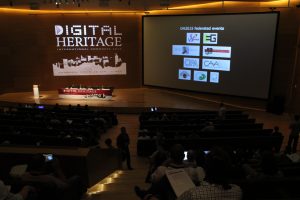
As the leading global event on digital technology for documenting, conserving, and sharing heritage—from landscapes and monuments to museums, collections, and intangible traditions—the Digital Heritage International Congress offers a unified stage for major world conferences, workshops, and exhibitions. The event features keynotes from cultural leaders and digital pioneers, tech expos, research demos, scientific papers, policy panels, best practice case studies, and hands-on workshops.
Covering fields such as computer science, cultural preservation, archaeology, art, and more, it brings together professionals from across domains. Whether they are educators, technologists, researchers, policy makers, or curators, participants gather to explore and debate the potentials and challenges of digital technology for cultural heritage, ensuring vibrant dialogue and collaboration among leaders from diverse backgrounds.
The first two editions of the congress were hosted in culturally significant cities, with support from major international and national bodies like UNESCO, the European Commission, the French Ministry of Culture, the Spanish Ministry of Economy and Competition, and the Italian and French National Research Councils (CNR and CNRS). Key federated events have included:
- International Conference on Virtual Systems and Multimedia (VSMM)
- Eurographics Symposium on Graphics and Cultural Heritage (GCH)
- UNESCO’s Memory of the World
- ArcheoVirtual Exhibition on Virtual Archaeology and Museums
- Digital Art Week (DAW)
- Int’l Meeting on Archaeology, Graphic Informatics, Heritage & Innovation (ARQUEOLOGICA 2.0)
Special sessions also included contributions from:
- CAA,
- Space2Place,
- ICOMOS Digital Interpretation Panel
The congress also provided a platform for major European heritage projects to organize workshops, tutorials, and meetings.
Congress Concept
The Digital Heritage Congress and Expo are centred on core digital topics and heritage themes that are revised at every edition.
Each congress typically spans 4-5 days with parallel sessions and a major exhibition.
It is organised around a scientific core with a conference made of parallel sessions (the DigitalHeritage Congress), high level speeches, panels, workshops, sessions and tutorial and a main scientific exhibition (the DigitalHeritage Expo).
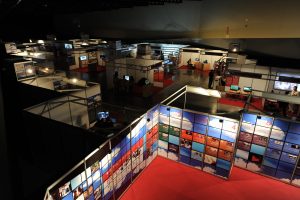
Past Editions:
Digital Heritage 2013 – Marseille, France (28 Oct – 1 Nov 2013)
The first joint Digital Heritage congress took place in Marseille, France, as part of the European Union’s Capital of Culture celebrations. Over the course of the five-day event, it attracted 700 participants from around the world. The “Digital Heritage Expo,” a major highlight of the event, showcased innovative solutions and challenges in heritage preservation, drawing 3,000 visitors to a 600m² exhibition space. Academically, the congress was highly competitive, with 101 full papers selected for publication (a 30% rejection rate), and joint proceedings were published in open access by IEEE and Eurographics. Several prestigious awards were given, including six Best Paper Awards published in ACM JOCCH, three Best Applications Awards, and two Autodesk Awards recognizing young innovators. In addition, tutorials and workshops have been organized by EU projects. DH2013 has been organised by the French CNRS.
Federated Events in 2013 have been: ARCHEOVIRTUAL: Exhibition on Virtual Archaeology and Museums; ARQUEOLOGICA2.0: Int’l Meeting on Archaeology, Graphic Informatics, Heritage & Innovation; DAW: Digital Art Week; CAA: Fall Symposium; CIPA: Special ICOMOS/ISPRS Heritage Documentation Workshop; GCH: Eurographics Symposium on Graphics and Cultural Heritage; Space2Place: Special Workshop on Remote Sensing in Archaeology; VSMM: International Conference on Virtual Systems and Multimedia; MEMORY of the WORLD: UNESCO Int’l Conference on Memory of the World in the Digital Age; ICOMOS ICIP: Digital Interpretation Panel of International Committee for Heritage Interpretation & Presentation.
DigitalHeritage Expo 2013 has been a large exhibition on Digital Heritage. Spread over more than 700 sqm of space, the exhibition was divided into 6 unique categories: Immersive Environments, DigitalHeritage @ Work, Virtual Museums, Edutainment, Art and Creativity, Multivision.
For more details, visit the official website: www.digitalheritage2013.org
PUBLICATIONS:
- C. Addison, L. De Luca, G. Guidi, S. Pescarin (eds). Digital Heritage International Congress (DigitalHeritage), 2013, Volume 1, IEEE Catalog Number: CFP1308W-USB, ISBN: 978-1-4799-3169-9, 10.1109/DigitalHeritage32292.2013
- C. Addison, L. De Luca, G. Guidi, S. Pescarin (eds). Digital Heritage International Congress (DigitalHeritage), 2013, Volume 2, IEEE Catalog: CFP1308W-USB, 978-1-4799-3169-9, 10.1109/DigitalHeritage32292.2013
S., Clay, A., & De Luca, L. (2013). DigitalHeritage 2013 Expo. Volume 3. Catalogue of the Exhibition, ISBN 978-88-902028-1-0
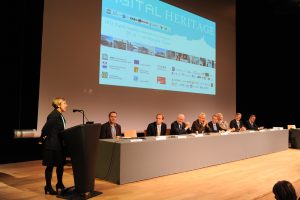
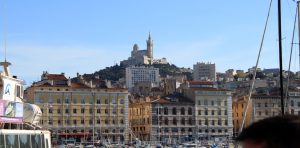
Digital Heritage 2015 – Granada, Spain (28 Sep – 2 Oct 2015)
In 2015 DigitalHeritage was held in Granada, Spain, at the Science Park in collaboration with Alhambra. This event brought together approximately 500 researchers and featured an exhibition covering 1000 m².
Federated Events of the 2nd edition have been: ARCHAEOVIRTUAL, Sofia Pescarin, Italian National Research Council (Italy); ARQUEOLOGICA2.0, Alfredo Grande & Jose Luis Lerma, Spanish Society of Virtual Archaeology (Spain); CAA, Lisa Fischer, Jamestown Rediscovery (USA) and Heather Richards-Rissetto, University of Nebraska-Lincoln (USA); CIPA (ICOMOS), Andreas Georgopoulos, National Technical University of Athens (Greece) and Mario Santana, Carleton University (Canada); GCH, Dieter Fellner, Fraunhofer IGD (Germany) and Roberto Scopigno, Italian National Research Council (Italy); Space2Place, Maurizio Forte, Duke University (USA) and Stefano Campana, University of Cambridge (UK); VSMM, Alonzo Addison & Livio De Luca, VSMM Society
The DigitalHeritage Expo 2015 has been organised at the Science Museum, hosting 32 Projects Selected, and awarding : 1 Best Content Award and 1 People’s Choice Award
PUBLICATIONS:
- Guidi, R. Scopigno, J.uC. Torres, H. Graf, F. Remondino, L. Duranti, P. Brunet, S. Hazan, J. Barcelo (Eds), 2015 Digital Heritage International Congress (2015 Digital Heritage), Volume 1, IEEE Catalog Number: CFPI508W-ART ISBN: 978-1-5090-0048-7
- Guidi, R. Scopigno, J.uC. Torres, H. Graf, F. Remondino, L. Duranti, P. Brunet, S. Hazan, J. Barcelo (Eds), 2015 Digital Heritage International Congress (2015 Digital Heritage), Volume 2, IEEE Catalog Number: CFP1508W-ART, ISBN: 978-1-5090-0048-7
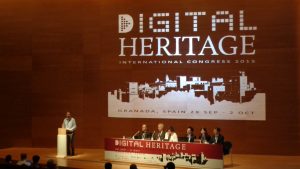

Digital Heritage 2018 – San Francisco, USA (26-30 October 2018)
In 2018, the digital heritage event ventured beyond Europe for the first time, taking place in the vibrant and historic Bay Area of San Francisco. Set against the backdrop of the waterfront, this landmark event was organized around four primary heritage categories, reflecting the spirit of UNESCO: Built Heritage: From monumental structures to archaeological sites, cities, and landscapes, this category encompasses the UNESCO World Heritage Convention; Artifacts & Collections: Covering movable objects and the museums that house them, this category aligns with the UNESCO Movable Heritage & Museums Program; Libraries & Archives: Documenting heritage through books and audiovisual collections, this category is guided by the UNESCO Memory of the World Program; Culture & Traditions: Including folklife, languages, crafts, song, and dance, this category reflects the UNESCO Intangible Heritage Convention.
The federated events included: 2018 24th International Conference on Virtual Systems & Multimedia (VSMM 2018); The Pacific Neighborhood Consortium: PNC 2018; Computer Applications & Quantitative Methods in Archaeology: CAA Special Session; EU E-RIHS Project & Italian National Research Council; EU ARIADNE Project & Community; EU PARTHENOS Project; 5D Virtual Heritage of Medieval Culture Special Session; EMOTIVE EU Project Special Session, Sheffield Hallam Univ. & EU meSch Project Special Session, Int’l Council on Monuments & Sites/Int’l Society for Photogrammetry & Remote Sensing: ICOMOS/ISPRS CIPA Special Session, ICOMOS Int’l Scientific Committee for Interpretation & Presentation of Cultural Heritage (ICIP), Int’l Symposium on Remote Sensing in Archaeology: Space2Place 2018 Special Session, ARCHAEOVIRTUAL, EU REVEAL Project .
For more details, visit the original program schedule here.
PUBLICATION:
- C. Addison & H. Thwaites (eds), Proceedings of the 2018 3rd Digital Heritage International Congress (DigitalHERITAGE) held jointly with the 2018 24th International Conference on Virtual Systems & Multimedia (VSMM 2018), Volume 1, IEEE Catalog Number: CFP1308W-USB, ISBN: 978-1-4799-3169-9
- C. Addison & H. Thwaites (eds), Proceedings of the 2018 3rd Digital Heritage International Congress (DigitalHERITAGE) held jointly with the 2018 24th International Conference on Virtual Systems & Multimedia (VSMM 2018), Volume 2, DOI: 10.1109/DigitalHeritage32292.2013
